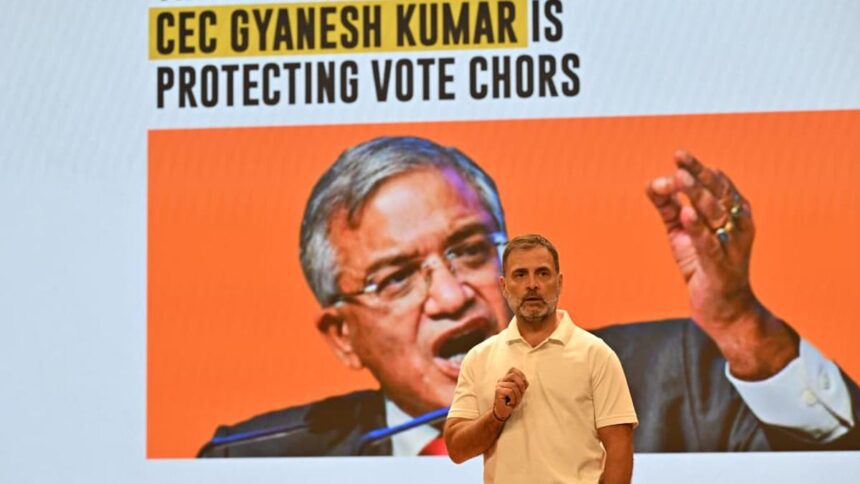In the world’s largest democracy, there was once a sacred covenant: that every vote cast would be counted, and every vote counted would be honest. That covenant is now under siege — not by shadowy insurgents or foreign agents, but by those entrusted to protect it: the ruling party and the very institution meant to be democracy’s firewall — the Election Commission of India (ECI).
Rahul Gandhi’s explosive “Aland Files” speech in Karnataka, where he accused the ECI and BJP of orchestrating “vote chori” — vote theft — isn’t just political rhetoric. It is a distress flare fired from the deck of a sinking democratic vessel. And if we ignore it, we do so at our peril.
What Gandhi laid bare — with names, dates, and chilling specifics — is a pattern not of isolated malfunctions, but of systemic sabotage. He didn’t just allege fraud; he alleged collusion. He didn’t just point fingers at booth-capturing goons; he pointed at the Chief Election Commissioner himself — accusing Rajiv Kumar of shielding “destroyers of democracy.” This is not a throwaway line. It is an indictment.
Let’s be clear: “Vote chori” is not merely about EVMs being tampered with or VVPATs not being matched. It’s about the brazen subversion of process — the quiet reassignment of honest officers, the sudden transfer of vigilant Returning Officers before counting, the inexplicable malfunction of machines in opposition strongholds, the refusal to conduct meaningful recounts even when statistical anomalies scream foul.
In Aland, as Gandhi detailed, the ECI’s own observers reportedly witnessed ballot boxes being ferried away. Counting was abruptly halted. Votes “disappeared.” And when questions were raised? Silence. Then, protection. The officer who tried to raise the alarm? Transferred. The officer who oversaw the suspicious count? Promoted.
This is not incompetence. This is choreography.
The ECI, once a globally respected institution, now resembles a captured agency — its autonomy eroded, its moral authority hollowed out. Under this Commission, we have seen opposition rallies denied, ruling party violations excused, press conferences weaponized, and dissenting voices within the bureaucracy systematically sidelined. The message is clear: fall in line, or be moved out of the way.
And the BJP? It doesn’t even bother to hide its playbook anymore. From “model code of conduct” violations treated as minor traffic offenses, to deploying central agencies as political cudgels, to now — allegedly — manipulating the final sanctum of democracy: the counting room. If votes can be stolen without consequence, then elections are not expressions of the people’s will — they are theatrical performances, stage-managed for predetermined outcomes.
Democracy dies not with a bang, but with bureaucratic memos, silent transfers, and the slow normalization of the outrageous. When the media shrugs, when the courts delay, when citizens are told “prove it” in a system designed to make proof impossible — that’s when autocracy slips in through the back door.
Rahul Gandhi’s “hydrogen bomb” is not an attack on institutions — it is a desperate attempt to save them. To say what millions whisper but fear to shout: that the game is rigged. That the umpire is in the owner’s pocket. That “one person, one vote” is becoming “one party, one outcome.”
The international community is watching — and recoiling. Global democracy indices are downgrading India. Election observers are filing alarmed reports. But domestically, the echo chamber drowns out dissent with chants of “anti-national” and “conspiracy theorist.”
We must ask: What is more dangerous — a politician alleging vote theft, or a system that makes such allegations plausible?
If the ECI has nothing to hide, let it open the black box. Let it allow full VVPAT matching. Let it publish granular, booth-wise EVM data. Let it reinstate officers who blew the whistle. Let it invite international observers — not just token diplomats, but forensic auditors.
And if the BJP is confident in its mandate, let it welcome scrutiny. Let it stop treating every question as sedition. Let it prove, beyond statistical improbability and bureaucratic obfuscation, that its victories are earned — not engineered.
Democracy is not a logo to be branded on campaign posters. It is a living, breathing social contract — and it is fraying. “Vote chori” is not a slogan. It is a symptom. A warning. A cry.
The time for polite silence is over. The time for institutional courage is now.
If we let this slide — if we normalize stolen votes, captured commissions, and silenced dissent — then we are not just betraying this election.
We are burying Indian democracy.










